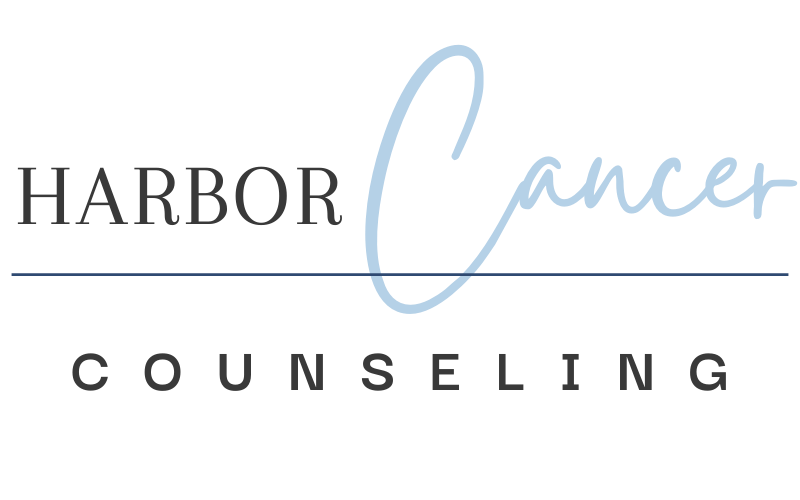AYA and Early-Onset Cancer: How They’re Alike — and How They’re Not
Cancer sucks, no matter how old you are. It affects everyone differently, but researchers have noticed that some experiences are more common at certain ages.
At Harbor Cancer Counseling, most of my clients fall into 1 of 2 categories: AYA (Adolescent & Young Adult) and Early-Onset. AYA covers anyone 15-39 years old with a cancer diagnosis, while Early-Onset covers 18-50.
So what’s the difference between the two? Being in that AYA category is more about your stage of life — maybe you’re in college, starting your career, or having kids. Early-Onset, on the other hand, is more about when you’re diagnosed — meaning you received your cancer diagnosis before you turned 50.
You can definitely fit into both groups, especially if you’re in that 18–39 range. But someone who’s 46 is usually only considered to have an Early-Onset diagnosis and won’t be categorized as a YA.
What’s most important to know is that people in these groups are in an in-between stage when it comes to cancer: they’re no longer kids, so they’re responsible for their own health, but serious illnesses like cancer may not have been on their radar. After all, the chances of getting cancer go up much more when you’re 50 or over.
So how might cancer affect you if you’re diagnosed at a younger age?
Common Challenges
Here are some common concerns for AYAs with cancer:
Losing your independence
Hitting pause on school or work
Financial strain
Isolation from friends or others your age who aren’t dealing with anything similar
Worries about fertility
Parenting (How do I tell my kids about my diagnosis? How do I parent when I’m exhausted? What do I tell the school?)
Body image
How to navigate health insurance and the medical system
Dating (Do I still do it? If I do, do I tell the person about my diagnosis? When and how?)
Intimacy with your partner, whether it’s emotional, sexual or something else
Dealing with long-term impacts of cancer or the treatments (especially when it comes to finding your new limits)
Anxiety about recurrence
Not every YA will experience all – or even most - of these challenges. And some of them can look very different if you’re 15 vs 35. For example, when we’re talking about fertility at 20, the questions might be, “Do I even want kids? Should I do fertility preservation just in case?” But if you’re in your 30s and you’re actively trying to have kids, fertility issues definitely feel different.
And what about when you get to those 40-49 year-olds, i.e. the ones who fit that Early-Onset category? A lot of the challenges above are still there, but some may look different:
Pausing work: You may have been in your career for a while and might have more responsibility. Taking an extended amount of time off is a bigger deal now.
Family responsibilities: Parenting is still a challenge, even if kids are older. And the likelihood of being part of the sandwich generation, where you’re also taking care of your parents, goes up.
Financial strain: You’re more likely to have a mortgage or other financial responsibilities that someone in their 20s doesn’t.
And a newer one: Health. You may never have had a serious illness like cancer, but it’s not uncommon that other health issues may have popped up.
Where We Are Now
Even though there’s a better idea of what you all deal with throughout treatment and beyond, we haven’t quite figured out the best ways to help. Some hospitals have programs specifically for those YAs (and their adolescent counterparts), but many don’t. And support groups? I’ve lost track of how many clients I’ve had who have told me they were the youngest person in the room and couldn’t identify with what everyone else was going through. The good news for that last point is that there are more organizations that have started to offer support groups and meet-ups for younger cancer patients.
But it’s obvious we need more: more therapists who understand cancer and its impacts on people in that 15-49 age range, more funding for YA programs, and more resources in general. If you’ve got any ideas on what else would helpful, feel free to post a comment below.
Stay tuned for a post on caregivers and what they face.
References:
National Cancer Institute (2025, May 8). Adolescents and Young Adults with Cancer. https://www.cancer.org/cancer/types/cancer-in-young-adults/cancers-in-young-adults.html
Yale Medicine (2024, August 1). What to Know About Rising Rates of ‘Early-Onset’ Cancer. https://www.yalemedicine.org/news/early-onset-cancer-in-younger-people-on-the-rise
National Cancer Institute (2025, May 2). Age and Cancer Risk. https://www.cancer.gov/about-cancer/causes-prevention/risk/age
Yale Medicine (2025, September 9). Cancer Puts Life and Dreams on Hold for Younger Adults. https://www.yalemedicine.org/news/cancer-puts-life-and-dreams-on-hold-for-younger-adults
Waters, A. R., Mann, K., Warner, E. L., Vaca Lopez, P. L., Kaddas, H. K., Ray, N., Tsukamoto, T., Fair, D. B., Lewis, M. A., Perez, G. K., Park, E. R., & Kirchhoff, A. C. (2022). "I thought there would be more I understood": health insurance literacy among adolescent and young adult cancer survivors. Supportive care in cancer : official journal of the Multinational Association of Supportive Care in Cancer, 30(5), 4457–4464. https://doi.org/10.1007/s00520-022-06873-2

